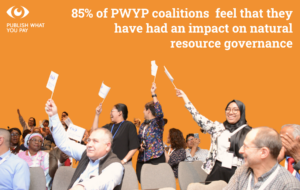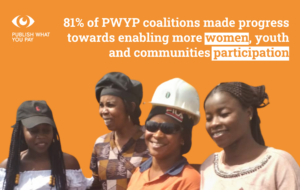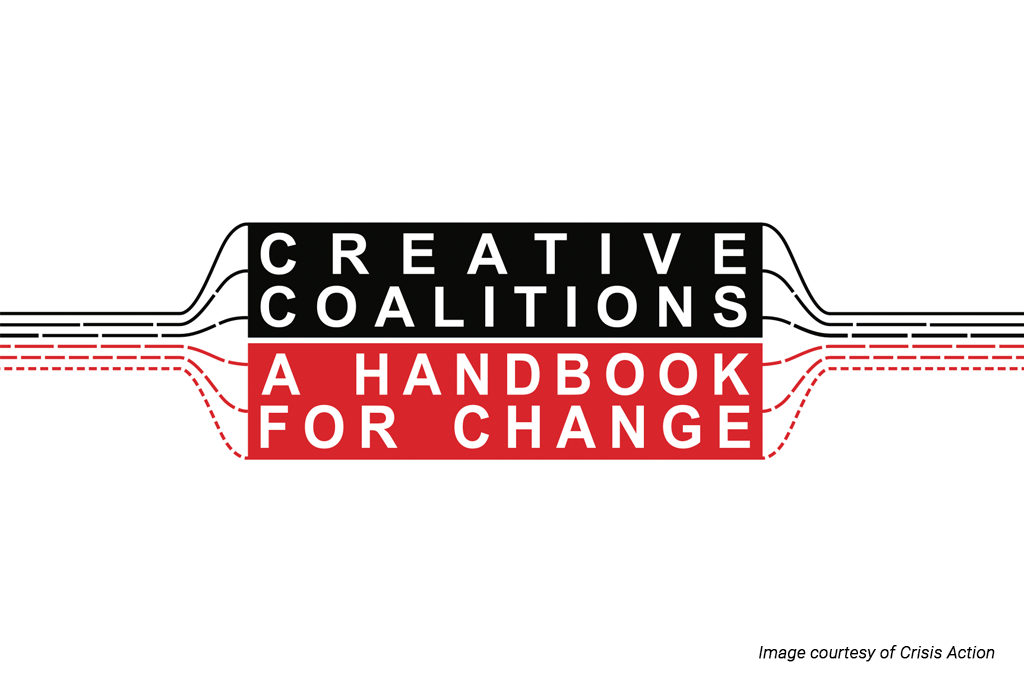The extractive sector has long been defined by poor governance and a lack of transparency which contribute among other things to corruption, human rights abuses and environmental degradation, putting people and the planet at risk. Tackling these challenges means battling against deeply entrenched and powerful interests – which can take years of advocacy.
39 out of 51 PWYP national coordinators responded to the latest annual survey which aims to track our progress over time in implementing our Vision 2025 strategy. The survey reveals snapshots of processes that sometimes take years to unfold. The responses this year underline how PWYP coalitions around the world are increasingly directing their focus to securing an equitable energy transition, as the world moves to decarbonise in the face of the climate crisis.
Pushing for better governance
Overall, the message from the National coordinators who responded to the survey was positive.
Most of them (85%) felt that their coalition had made an impact on natural resource governance in the past 12 months, and 64% of respondents reported at least some progress in being better able to use data to strengthen governance.
National coordinators said that the key stepping stones towards progress included:
- empowering communities and vulnerable groups to get companies and government to meet their obligations
- pushing for better deals and more revenues – and ensuring that funds were better used and distributed
- strengthening policy and legal frameworks to enable better oversight and protection of the public interest
- creating high profile national debates on the ‘pros and cons’ of extraction to help promote the public interest in decision-making
Survey responses from National Coordinators in East and Southern Africa illustrate these achievements with concrete action.
Snapshot: East and Southern Africa
In Zimbabwe the PWYP coalition analysed tax data to reveal that tax breaks for mining and other companies resulted in hundreds of millions of dollars of lost tax revenue. The PWYP Zimbabwe National Coordinator described how the coalition used this analysis to trigger meetings with tax and budget authorities and ministries, to push for full disclosure about who gets tax exemptions and why – and to advocate for closing tax breaks that reduce benefits to citizens and revenues to communities.
Meanwhile, the PWYP Tanzania coalition, HakiRasilimali, hosted a national extractive conference, and brought together community representatives, academia, CSOs, government, National Assembly members, media, INGOs and extractive companies to debate the future of extraction in the country. At the conference, the Ministry of Minerals of Tanzania committed to developing a strategy to manage critical minerals in the country and to outline its contribution towards transitioning to clean energy.
PWYP Zambia held an Alternative Mining Indaba and helped strengthen government policies on economic diversification and domesticating value from extraction.
Part of PWYP Kenya’s work in 2022 included strengthening women’s and community groups’ knowledge of environmental monitoring and benefit sharing – equipping them with more knowledge to be able to participate in negotiations with companies and local authorities more effectively.

Pushing for more and better disclosure
The 2023 survey also showed that securing specific data disclosures remains a key tool for the network in the
push for good governance and accountability.
30 out of 38 (79%) of National Coordinators who responded reported at least some progress on pushing for more and better disclosures.
Snapshot: beneficial ownership and contract disclosures
In Nigeria for example, the PWYP coalition helped secure an operational beneficial ownership register, while PWYP Indonesia helped improve beneficial ownership disclosure rates. PWYP Canada secured a government commitment to implement a public beneficial ownership register during 2023, following five years of coalition advocacy.
The survey also showed that more coalitions joined the fight for contract disclosure – 26 in total. For some coalitions the focus was on securing access to specific contracts – such as the Rosneft oil contract in Lebanon – in order to scrutinise them and make public recommendations on how deals must be improved.
In others, such as DRC, Nigeria and Yemen, coalition efforts were focused on creating new contract disclosure rules. The PWYP Mali coalition secured the publication of 100 mining contracts.
Enabling communities and excluded groups
Central to PWYP’s theory of change is empowering communities and excluded groups, so that they have a say in decisions affecting them. The 2023 survey showed that a great deal of network effort was invested in this approach in 2022.
32 out of 38 (81%) of National Coordinators who responded reported that their coalitions had made at least some progress in enabling communities, women and youth to increase their participation in extractive governance during 2022.
Snapshot: enabling communities and vulnerable groups
For example, National Coordinators from Burkina Faso, Côte d’Ivoire, Gabon, Guinea, India, Mozambique, Nigeria and Sierra Leone all reported that coalitions conducted work to ensure that communities and excluded groups were better represented in decision-making about community mining funds.
Several coalitions also took positive actions to strengthen excluded groups’ engagement within the coalition itself, including in Indonesia, Iraq, Lebanon, Mauritania, Republic of Congo, Tajikistan, Tanzania, Uganda and Zimbabwe.
Expanding the remit – climate and the energy transition
Critical issues surrounding the energy transition have become increasingly relevant for PWYP coalitions. As demand for renewable energy soars, PWYP coalitions around the world are responding.
While there was a marked absence of references to the climate crisis and energy transition in previous surveys, in the 2023 survey 22 National Coordinators out of 38 (58%) reported that their coalitions had engaged with these issues in some way in the preceding 12 months – and similar numbers had taken part in joint planning with other sister PWYP coalitions on tackling the critical issues that are arising as the world moves to rapidly decarbonise.
Progress on network connectivity
The 2023 survey shows that National Coordinators and the PWYP International Secretariat together made further strides in fostering network connectivity, with PWYP coalitions taking part in joint actions with each other more than before, and increasing numbers taking new advocacy approaches as a result of learning from sister coalitions.
Snapshot: collaboration in the MENA and EURASIA regions
In Eurasia, for example, coalitions in Azerbaijan, Kazakhstan, Kyrgyzstan, Tajikistan and Ukraine linked-up on advocacy for contract transparency that resulted (among other things) in the Tajikistan coalition effectively persuading the government to publish mining licences and beneficial ownership data.
In the MENA region, National Coordinators from Iraq, Lebanon, Tunisia and Yemen came together multiple times in highly engaged collaborations on issues including contract disclosure, EITI, civic space and the energy transition.
Changes in context in 2022
The immediate impacts of COVID-19 receded in 2022, according to most National Coordinators – although they remained disruptive for a smaller group of coalitions.
They also reported that, overall, threats to coalition members’ rights, and restrictions on civic space, had receded by comparison with 2021. However, threats to civic space continue for a sizable minority of coalitions and they remain an ongoing challenge for the network. This is part of a wider theme of threats to civic space, with the newly released Civicus report showing that only 3.2% of the world’s population live in countries classified as having an open civic space.
Gender

The responses to the survey showed us that we still have work to do to diversify gender representation in national coalition leadership since 2021. PWYP members have committed to taking on a feminist perspective in everything we do through the adoption of our Gender Policy which provides a clear vision, a consistent message, and a coordinated approach to the promotion of gender justice across the movement. In March 2023, we published an Action Plan setting out indicators by which we can measure our progress in implementing this policy.
Keep on learning!
National Coordinators’ responses to the survey help us to capture a snapshot of progress and activity in the network. We hope to dig into some of the feedback further to grasp the lessons we need to take on board in order to make the extractive industry accountable and open – and ensure that peoples’ needs are at the heart of the energy transition.
To see the full briefing on the results of the 2023 National Coordinator Survey please click here.










